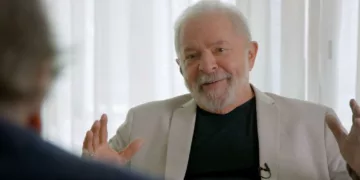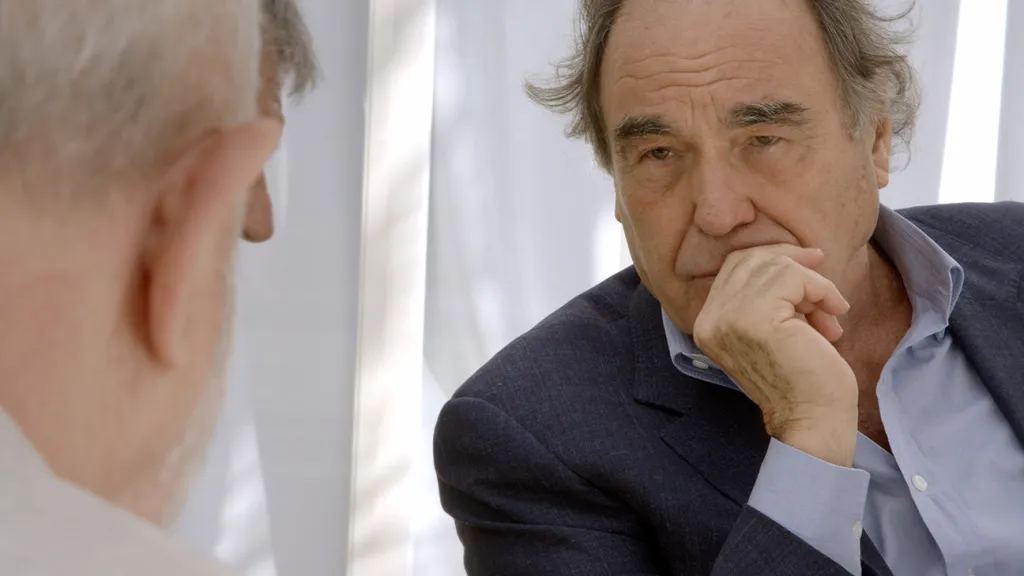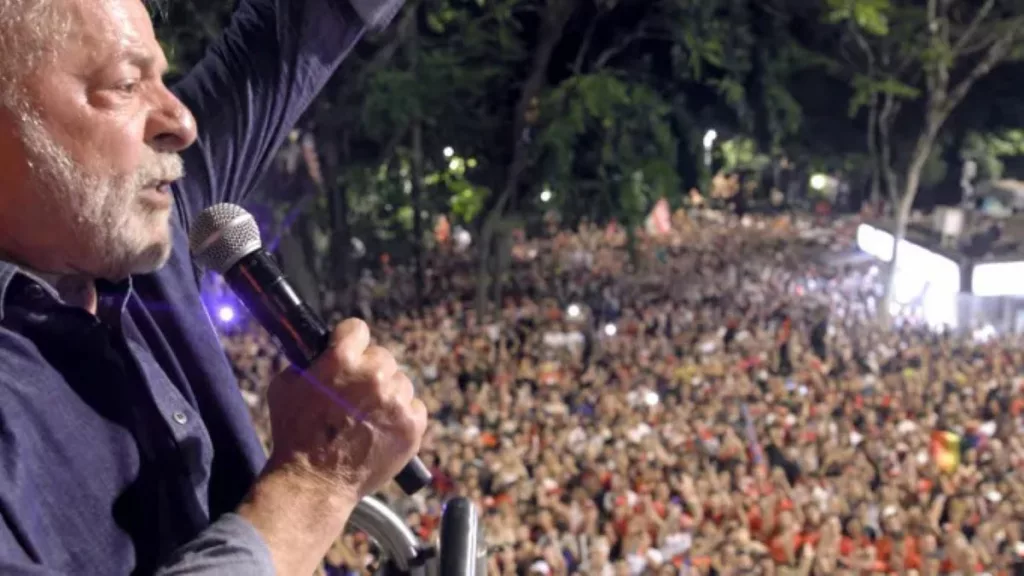Oliver Stone’s latest documentary profiles Luiz Inácio Lula da Silva, the former president of Brazil who remains one of the country’s most influential politicians today. Known simply as Lula, the steelworker-turned-labor leader defied the odds to become president not once but three times, though his political career was deeply marred by scandal and corruption allegations.
Through interviews with Lula himself as well as journalist Glenn Greenwald, Stone aims to chronicle both the man’s remarkable rise from poverty to high office and the tumultuous events that have engulfed Brazilian politics in recent years.
At its best, the film shines a light on controversies that have rocked Latin America’s largest democracy, from the impeachment of Lula’s successor, Dilma Rousseff, to the election and policies of Jair Bolsonaro. However, Stone makes little attempt to approach his subject dispassionately.
The filmmaker openly professes his admiration for Lula, posing softball questions and casting aspersions on the man’s opponents without delving more critically into credible issues around corruption. While the documentary brings valuable attention to foreign interference and efforts to undermine leftist governments, its hagiographic treatment of Lula limits its ability to give audiences a fully nuanced portrayal of this hugely consequential figure.
Oliver’s Eye View
Lula’s story is one of determination in the face of hardship. Growing up in poverty, he left school early to help provide for his large family in their small town. By his teens, he had moved to Sao Paulo to work long hours operating heavy machinery in noisy factories. It was grueling work that demanded focus yet offered little reward or freedom.
Things started looking up as Lula fought for better conditions and pay as a union leader. By 30, he had risen to head the steelworkers’ union and organized Brazil’s first national strike. Speaking passionately at rallies, he gave a voice to workers but ruffled the feathers of those in power. While his family life was marked by tragedy early on, his involvement in politics grew.
After the military dictatorship fell, Lula co-founded the left-leaning Workers’ Party. His grassroots campaign style connected with many, yet establishment forces remained wary. He tried four times to become president but narrowly lost each election. Undeterred, Lula continued meeting people where they were. His down-to-earth manners and focus on combating hunger and homelessness gained trust.
Victory finally came in 2002. As president, Lula proved the doubters wrong. His social programs pulled millions out of dire poverty and slums. Under his presidency, Brazil’s economy boomed while inequality shrank. Internationally, Lula represented a hopeful new generation of diverse leaders from humble beginnings. By leaving office, his approval ratings broke records in the high 80s.
Again elected in 2006, Lula’s legacy of uplifting the nation through jobs and welfare was just beginning. Having climbed from lowly factory work to the apex of power, his story inspired millions to believe that change was possible through solidarity and democratic progress.
The Fight for Democracy
The impressive gains achieved under Lula and the Workers’ Party would not last. A new threat emerged in the form of Operation Car Wash, launched in 2014 as an anti-corruption probe. On the surface, investigating political graft seems laudable. However, evidence soon emerged that more was afoot.
Key figures linked the investigation to political motives. Judge Sergio Moro, leading the case, had aspirations to higher office and saw derailing the PT as advantageous. Tapped phone calls between prosecutors and Moro, later exposed by journalist Glenn Greenwald, revealed the inquiry’s legally questionable tactics. Prosecutors pursued charges against PT leaders even as investigations by other parties languished.
By 2016, the plot had succeeded. The scandal, however unfounded, tarnished Dilma Rousseff’s image, and she was impeached in a sketchy trial, deprived of her mandate despite no direct involvement in wrongdoing. With the PT’s standard bearer jailed on similarly shaky grounds, Jair Bolsonaro rode a wave to the presidency in 2018.
His extreme positions—favoring dictatorship and denouncing indigenous and LGBT rights—coupled with his denial of the pandemic’s risks plunged Brazil into crisis. The economy suffered, the Amazon burned, and its invaluable biodiversity was threatened by unchecked deforestation. However, the demise of the PT had empowered forces intent on reversing its vision of a just, equitable Brazil.
When his conviction was annulled, Lula emerged once more to contest the 2022 election. Hope appeared on the horizon as the workers’ leader, champion of the poor, and protector of the environment gained momentum. The deciding votes hung in the balance. Had democracy’s defenders prevailed, or would Brazil succumb to the growing global tide of authoritarianism?
Oliver Stone Brings Passion to the Story of Lula
Oliver Stone is known for his unflinching documentary style, which brings political figures to life through intimate interviews. In Lula, we see this approach in full effect. His one-on-one with the former Brazilian president is quite revealing. We witness Lula’s charisma and understand what led many to find inspiration in his journey from steelworker to leader.
While incorporating historical footage is common, Stone leans heavily on archives and first-person narration here. At times, it moves at breakneck speed, glossing over nuance. But it works to engage viewers unfamiliar with this chapter in Brazil’s history. We grasp the essence of Lula’s ambitions for an egalitarian nation and the forces that later moved to undermine it.
Where the film likely loses some is its lack of probing questions, listening mostly to Lula’s side of controversies. A few more perspectives could have offered greater insight into the opposition’s claims. However, Stone remains transparent about his aim to capture this iconic figure through admiring eyes.
For those less steeped in Brazilian politics, Lula brings to life a pivotal leader and moment. Stone brings his trademark zeal, making an appropriately passionate case for his subject’s legacy. While not an entirely balanced study, his clear affection shines through, ensuring viewers feel they’ve experienced Lula the man, not just learned about a contentious period in his nation’s history.
A Moment in History
For many, the story of Lula and Brazil’s turbulent political times in the early 2000s reads like a fast-paced drama. Behind the human narratives, though, deeper currents were flowing. Oliver Stone shines a light on some of the wider forces that shaped events, from US involvement in Brazil’s 1964 coup to more recent allegations of “lawfare” targeting left-leaning governments across South America.
We learn that declassified documents confirm Lyndon B. Johnson’s support for the military takeover that installed a brutal dictatorship. Years later, documents disclosed by Edward Snowden showed the extent of US spying on Lula’s Workers’ Party and figures like Dilma Rousseff. These cracks in history’s façade raise important questions about the reach of foreign influence.
Stone also examines the idea of “lawfare,” where legal weapons can be wielded instead of military force to engineer regime change. Across the continent in that era, nearly identical scripts saw popular leaders suddenly facing prosecution for corruption. Lula himself came to see the immense “Car Wash” investigation in this light, as a means to dismantle his party’s power.
Perhaps most controversially, the former president professes better relations with Bush than Obama regarding the region. He describes meeting with understanding from the earlier administration, in contrast to the latter’s alleged dislike for Latin America’s shifting politics. Stone backs this with mentions of pro-coup senators courting allies in Washington.
Tantalizing as these glimpses are, firm evidence remains elusive. Names go unsaid, and the documentarian’s penchant for conviction over nuance leaves viewers grasping at shadows. Though history offers clues, its deeper truths often lie buried until more open eyes can read its veiled script. For now, Lula the film serves as a fragment in the mosaic, a prompt for those still piecing together how democratic winds once shifted so swiftly below the border.
The Victory Of Hope
After walking through Lula’s turbulent history, the documentary builds towards its climax, Election Day 2022. We feel the stakes couldn’t be higher as Brazilians choose between two opposing visions. Will they empower the growing extremism that threatens democracy? Or will they win back the future stolen years ago?
Stone dramatizes the vote counting, ratcheting up the tension even though we know the result. Every swung is hard-earned. When the narrow margin emerges, cheers fill the theater as if it’s our victory too. Bolsonaro’s defeat means so much more than a political loss; it’s a rejection of all he represented. But it also reminds us how close we came to a different outcome.
It’s a cathartic moment of hope restored. Yet it leaves more questions. Stone focuses solely on the election drama without exploring what followed. The silent coup attempt went unmentioned, along with ongoing fights over the future.
While the film celebrates a people’s resilience, one wishes it dug deeper to find the challenges that resilience still faces. But perhaps its aim was a simpler one—to remind us that even in dark times, hope can prevail through the power of democracy and a united purpose.
Oliver Stone’s Lula Spreads Hope, But Leaves Room for More Insights
Oliver Stone’s documentary about Brazilian leader Lula achieved its aim of celebrating the man and his remarkable story, vindicating him in the eyes of his many supporters. For those less familiar with modern Brazilian politics, the film served as a crash course in history, touching on social movements, military rule, and the rise of the Workers’ Party. It traced Lula’s path from poor boy to president, showing his commitment to uplifting others.
The film energized the audience with its portrayal of Lula’s wrongful imprisonment and 2022 election victory over Bolsonaro, a figure almost everyone could agree they were glad to see lose power. This will surely inspire those who see the light and opportunity that Lula brought millions of Brazilians. His determination to continue fighting for people despite his age was moving.
However, some topics that cut close to ongoing debates did not receive as much nuance or depth as some may have hoped. The film breezed past serious matters like the coup allegations and Lula’s questioning of certain foreign actors. They merit careful examination, given the echoes in other Latin nations. Also absent was discussion of the challenges that remain for Brazil’s democracy, like the recent unrest and how Lula plans to overcome divisions.
While it spread optimism and told Lula’s story well, Oliver Stone’s film left some feeling there was still more to say. With its subject being such a major figure, some lingering questions remain. Perhaps other films can build on this foundation to offer extra layers of understanding on topics too complex to be condensed into a single documentary.
Escaping Authoritarianism
A leader’s journey to overcome injustice and defend democracy—that’s the story at the heart of Lula. While the documentary doesn’t entirely succeed in conveying complexity, Stone presents a milestone of hope against difficult odds.
Certainly, more depth could have enriched our understanding of Brazil’s politics. Discussing foreign influence demands a thorough investigation, leaving no room for doubt. And vulnerable is truth when a single perspective holds sway.
Yet Lula also highlights courage in the face of crushing defeat. Through turmoil, a man emerged, empowering millions forsaken by cruel fate. By will and spirit, a nation transformed, proving another way exists.
If teaching revelation outweighs scholarship, maybe that transports some farther. Questions linger, but so does inspiration, drawing us to higher ground. When darkness looms and autocracy beckons, here shines a flame of no quelling—a flame for all people standing against oppression and building in freedom.
In highlighting one hero’s triumph over tyranny, the film amplifies democracy’s thrilling possibilities. It calls us to defend just rules springing from the public, as nature demands. With vigilance and solidarity, perhaps one day no leader will need to wage such struggles because citizens everywhere shape their own destiny.
The Review
Lula
While Lula provides an engaging overview of its subject's story, opportunities were missed to offer a deeper analysis of complex issues. Nevertheless, shining a light on challenges to democratic ideals remains valuable. By focusing on one man's resolve against authoritarian forces, the film highlights democracy's fragility and the continuous work needed by all people of good faith. Though not a comprehensive work of scholarship, Lula achieves the goal of inspiring reflection and debate around defending justice and civic participation.
PROS
- Engaging storytelling that draws viewers in
- Highlights the courageous struggle against oppression
- Sheds light on threats to democracy in Latin America
CONS
- Lacks nuanced analysis and thorough investigation
- Overly positive portrayal of Lula without critical examination
- Fails to provide deeper context around key issues


















































